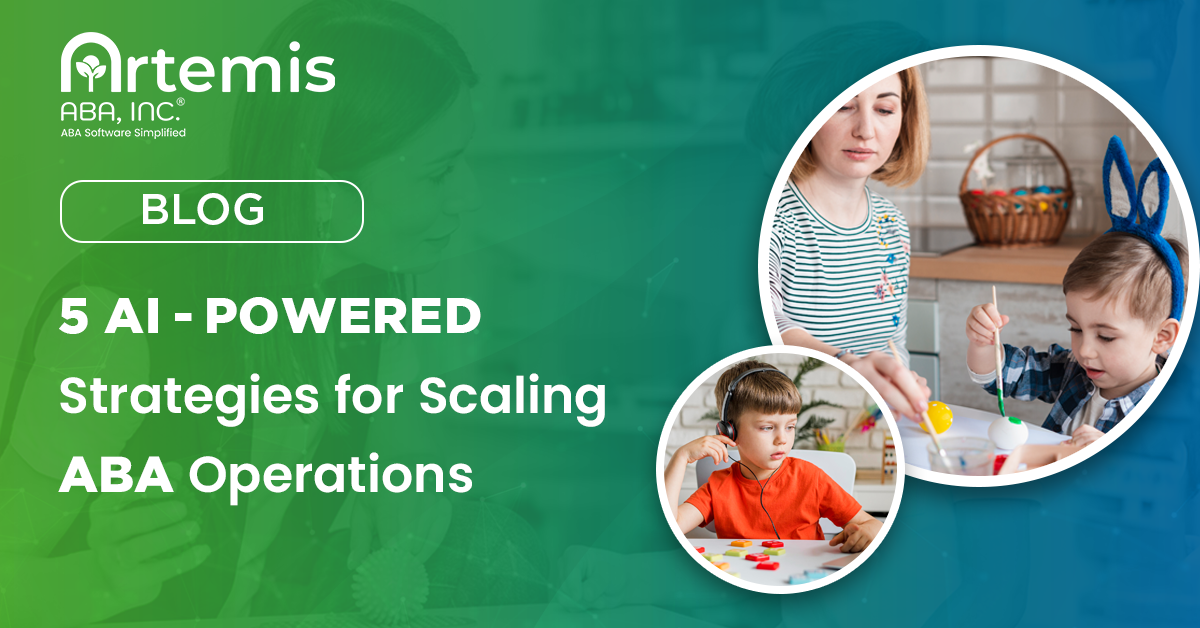Monday to Friday, 8 AM – 5 PM CST.
If you're reaching out outside these hours, please submit a support ticket—our team will respond as soon as possible.

Scaling ABA Operations: 5 AI-Powered Strategies for Multi-Site Clinics
In the next 12 months, more than 60% of enterprise ABA organizations plan to expand their footprint, but only a fraction is ready for the operational challenges. Growth is an uphill climb that strengthens your team but managing it across multi-site clinics is not something that can be sustained with manual processes alone.
Inside this article:
- Intelligent Scheduling That Balances Demand vs. Capacity
- Proactive Authorization and Eligibility Management
- Built-In Billing Automation
- Unified Analytics for Executive Oversight
- Smart Waitlist Conversion That Captures Untapped Revenue
- What ABA Leaders Should Take Away
Enterprise ABA organizations often reach a peak and then hit operational ceilings when they scale faster than their systems can handle. When client demand rises, it becomes nearly impossible to maintain the same rhythm using manual scheduling, billing, and staff coordination.
According to the 2024 Behavioral Health Business report, 68% of ABA leaders cite "operational inefficiencies" as their biggest barrier to growth. The solution is simple in theory but complex in execution - purpose-built ABA software that automates, integrates, and scales with your practice.
Here are five AI-powered strategies guaranteed to streamline your operations and boost efficiency, based on how leading ABA organizations use them in real-world scenarios.
1. Intelligent Scheduling That Balances Demand vs. Capacity
The challenge: multi-site ABA providers juggle hundreds of variables - retaining good therapists, handling travel zones, managing recurring sessions, authorization limits, staff shift windows, and no-show risks. Most legacy ABA systems weren't designed to manage this level of complexity, which resulted in increased admin overhead and lost billable hours.
How AI can help: An AI-powered scheduler can analyze therapist availability, compare it with client preferences, evaluate session history, match service types, and intelligently assign appointments all automatically. This reduces scheduling errors, avoids overbooking, and improves staff utilization.
Artemis ABA offers this built-in. Our intelligent scheduling allows you to compare group appointments, schedule individual sessions, and track staff capacity. It enables high-level visibility with less time spent on admin work.
2. Proactive Authorization and Eligibility Management
Authorization and eligibility management is a pain point for both small practices and multi-site ABA clinics. Authorizations expiring unnoticed and sessions being delivered but not reimbursed are more common than they should be. Manual tracking by client service teams tends to slow everything down, resulting in lost revenue.
According to CMS, 21% of ABA claims denied by Medicare Advantage plans in 2023 were due to lapsed authorizations or incorrect benefit information.
The AI advantage: ABA software with intelligent features can flag upcoming expirations, check eligibility in real time, and proactively alert teams before a session is delivered. With Artemis ABA's built-in authorization monitoring, you'll see these alerts directly in your scheduling and billing interface, so your workflow stays uninterrupted, and your revenue stays on track.
3. Built-In Billing Automation
Denials aren't just a revenue issue; they drain your team's time and morale. When a claim fails post-submission, it's already too late to prevent delays in payment cycles.
According to the Behavioral Health Billing Council, the average ABA organization spends over $12,000 per biller per year managing preventable denials.
The AI advantage: Software that applies payer-specific rules at the source makes a significant difference. An ABA billing tool with automation can flag missing codes, invalid modifiers, and duplicate sessions before the claim is submitted.
This translates to faster payments and fewer denials in your queue.
4. Unified Analytics for Executive Oversight
In many enterprise ABA organizations, data is scattered, split across clinical, operational, and billing systems. This creates blind spots in decision-making, compliance risks, and a disconnect in accountability.
The solution is an ABA data collection software suite that centralizes data from all key systems. Artemis ABA offers unified dashboards that connect clinical sessions, billing actions, and staff performance. This allows you to identify operational bottlenecks and proactively manage outcomes.
Real-time analytics support audits, payer negotiations, and growth forecasting, saving your organization thousands in inefficiencies and missed opportunities.
5. Smart Waitlist Conversion That Captures Untapped Revenue
Waitlists are a reality in ABA, but converting those leads into active clients remains a challenge. Without automation, families wait, revenue is lost, and care is delayed.
The AI strategy: automate referral matching. An ABA software that links your waitlist to real-time availability by site, provider, and payer. When a slot opens, the system flags eligible clients automatically.
Key features include:
- Waitlist-to-schedule engine
- Referral prioritization rules
- Conversion tracking + metrics
Why it matters: Converting just 10% more waitlist referrals can generate over $250,000 in additional revenue annually for a midsize ABA provider.
What ABA Leaders Should Take Away
You've invested in your people, your training, and your infrastructure. But without intelligent systems, scale becomes strain. Artemis ABA isn't here to replace your team. We're here to equip them with purpose-built tools that align to the complexity of growing ABA networks.
With Artemis, you get:
- Clean ABA billing workflows that adapt to payer complexity
- Scheduling tools that prioritize provider capacity and client urgency
- 3–5 hours saved weekly per BCBA
- A unified view of all operational and clinical activity
- Automation tools that cut down on admin load and overhead
Ready to Scale Without Stress?
Let Artemis ABA simplify the backend so your teams can focus on scaling heights, not fighting fires.
Book a live demo today and see how Artemis can help you build the next phase of your growth, on purpose-built software designed for ABA, not patched into it.
Schedule Your Walkthrough
Please enter your details and one of our team members will contact you shortly
See Artemis in Action
Enter your information below










%201.png)


